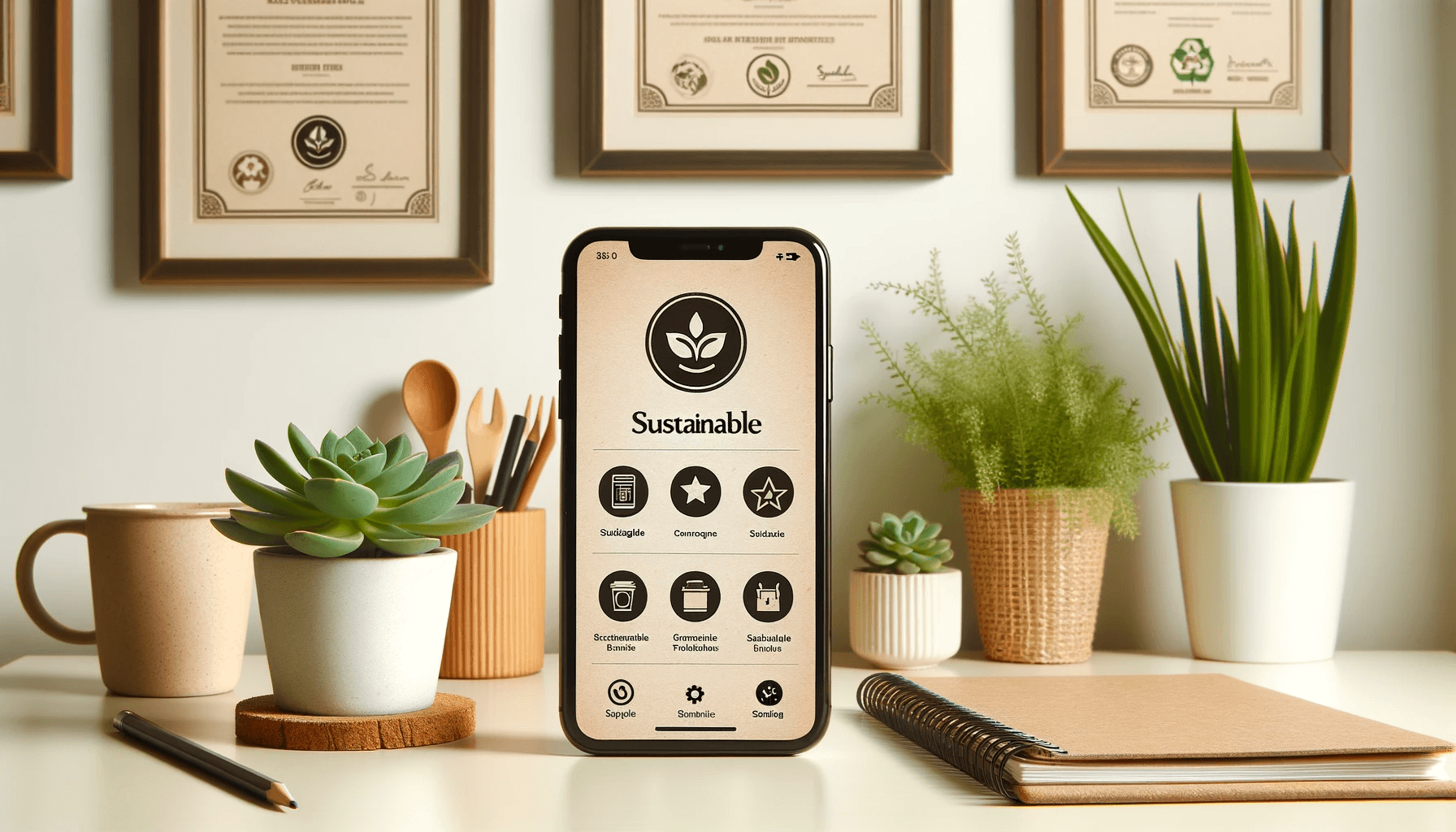Mobile apps have become an integral part of our daily lives, transforming the way we interact with various industries. In the realm of sustainability, mobile apps play a crucial role in bridging the gap between consumers and sustainable brands. This article explores the importance of sustainable brands, identifies the existing gap between consumers and sustainable brands, and highlights how mobile apps can bridge that gap effectively.
Sustainable brands have gained immense significance in recent years as consumers become more conscious of their impact on the environment and society. Defined as companies that prioritize social and environmental responsibility, sustainable brands strive to minimize their ecological footprint and contribute positively to the world.
However, despite the importance of sustainable brands, there are various challenges that hinder their adoption by consumers. These challenges include a lack of awareness regarding sustainable options, difficulty in finding sustainable brands, and consumer skepticism towards greenwashing practices.
This is where mobile apps come into play. Mobile apps provide a solution by offering increased accessibility to sustainable brands. They act as a platform for consumers to easily discover and connect with sustainable options, breaking down the barriers that hinder their adoption. With features like enhanced awareness and education, personalized recommendations, and seamless user experience, mobile apps empower consumers to make sustainable choices and bridge the gap between them and sustainable brands.
Mobile apps offer several benefits to sustainable brands as well. They provide opportunities to expand their consumer base, increase engagement and loyalty, and collect valuable data for analysis. By leveraging the power of mobile apps, sustainable brands can effectively communicate their values, products, and initiatives to a wider audience and foster a community of environmentally conscious consumers.
To illustrate the impact of mobile apps for sustainable brands, this article also highlights examples of successful apps that empower consumers to make sustainable choices and connect them with local sustainable brands. It also explores the future of mobile apps in the realm of sustainability, including the integration of augmented reality (AR) and virtual reality (VR), innovations in user experience, and collaboration with influencers and social media.
Key takeaways:
- Increased accessibility: Mobile apps provide consumers with easy access to sustainable brands, making it simpler to find and support environmentally conscious products and services.
- Enhanced awareness and education: Mobile apps bridge the gap between consumers and sustainable brands by raising awareness about the importance of sustainability and providing educational resources on eco-friendly choices.
- Personalized recommendations: Mobile apps offer personalized recommendations based on consumer preferences, helping users discover new sustainable brands that align with their values and lifestyle.
The Importance of Sustainable Brands
The Importance of Sustainable Brands
Sustainable brands play a crucial role in promoting environmental conservation and social responsibility. Here are a few reasons highlighting the importance of sustainable brands:
1. Environmental impact: Sustainable brands prioritize eco-conscious practices, reducing carbon emissions, conserving resources, and minimizing waste.
2. Ethical sourcing: Sustainable brands ensure fair labor practices and support communities by sourcing materials responsibly.
3. Consumer demand: People are increasingly conscious of their impact on the planet and are actively seeking out sustainable products.
4. Long-term viability: By adopting sustainable practices, brands can build trust, enhance their reputation, and attract loyal customers.
True history: Patagonia, a renowned sustainable brand, donated 100% of its Black Friday sales in 2016, totaling $10 million, to environmental causes. This act showcased the importance of sustainable brands using their influence to make a positive impact on the planet.
What are Sustainable Brands?
Sustainable brands, also known as eco-friendly or socially responsible brands, are companies that prioritize environmental and social responsibility in their business practices. They strive to minimize their ecological footprint, promote fair labor practices, and contribute positively to society. Sustainable brands go above and beyond meeting basic legal requirements and aim to make a positive impact on the planet and communities. Through initiatives such as using renewable energy, reducing waste, and supporting ethical sourcing, these brands are committed to creating a more sustainable future.
By choosing sustainable brands, consumers can align their purchasing decisions with their values and contribute to a greener and more equitable world. These brands have gained significant traction in recent years, driven by increasing consumer demand for eco-friendly and socially responsible products. Companies like Patagonia, Ben & Jerry’s, and Ecover have become synonymous with sustainability, showcasing that profitability can be combined with environmental and social stewardship.
The rise of sustainable brands is a direct response to the growing recognition of the urgent need to address climate change and social inequality. As consumers become more conscious of the impact of their choices, sustainable brands play a crucial role in shaping a more sustainable future for generations to come.
So, what are sustainable brands? They are companies that prioritize the environment, society, and future generations by promoting environmental responsibility, fair labor practices, and making positive contributions to society. These brands go beyond legal requirements to create a more sustainable future through initiatives such as renewable energy use, waste reduction, and ethical sourcing. Choosing sustainable brands allows consumers to align their values with their purchasing decisions and contribute to a greener and more equitable world.
Why are Sustainable Brands Necessary?
Why are Sustainable Brands Necessary?
It is imperative to understand the significance of sustainable brands and why they are necessary in our society. These brands play a vital role in prioritizing environmental and social responsibility. By addressing issues such as climate change and inequality, sustainable brands contribute to the well-being of communities and minimize their ecological footprint. They actively promote ethical practices and strive to create a more sustainable future. By choosing to support sustainable brands, consumers can make a positive impact and inspire other companies to adopt similar practices. By collectively supporting and promoting sustainable brands, we can effectively address the urgent challenges facing our planet.
The Gap Between Consumers and Sustainable Brands
Mobile apps have revolutionized the way we connect with sustainable brands, bridging the gap between consumers and conscious choices. In this section, we’ll uncover the various factors that contribute to this divide. From the lack of awareness and difficulty in finding sustainable brands to consumer skepticism and the role consumers play in sustainability transitions, we’ll dive into the challenges and opportunities that exist. Get ready to explore how asymmetric information and green food practices further shape this dynamic landscape.
Lack of Awareness
Lack of awareness acts as a significant obstacle when it comes to bridging the gap between sustainable brands and consumers. Numerous consumers remain unaware of the mere existence or the advantages associated with sustainable brands. In the absence of this crucial knowledge, consumers are unlikely to actively seek out such brands or make sustainable purchasing decisions. Thus, it becomes imperative to enhance awareness through educational campaigns, social media platforms, and collaborations with influential individuals. Mobile apps play a pivotal role in addressing this lack of awareness by providing accessible platforms for consumers to explore and gain knowledge about sustainable brands. By incorporating features such as news feeds, educational content, and personalized recommendations, these apps can effectively educate and engage consumers, ultimately encouraging them to opt for sustainable choices.
Difficulty in Finding Sustainable Brands
Finding sustainable brands can be challenging due to various reasons. The difficulty in finding these brands often stems from a lack of awareness among consumers regarding sustainable brands and their importance. Moreover, sustainable brands tend to have limited visibility in mainstream markets, further exacerbating the challenge. Consumers also exhibit skepticism towards sustainability claims made by brands, adding to the difficulty in finding authentic brands. However, mobile apps have emerged as a viable solution to bridge this gap. These apps not only enhance accessibility to sustainable brands but also contribute to raising awareness and educating consumers about the importance of sustainability. Additionally, these apps offer personalized recommendations, empowering consumers to make more informed choices when it comes to finding sustainable brands. With the assistance of mobile apps, consumers can overcome the aforementioned difficulty in finding sustainable brands and navigate the sustainable market more effectively.
Consumer Skepticism
Consumer skepticism, which plays a crucial role, is a significant factor in the gap between consumers and sustainable brands. The lack of trust in green claims and the skepticism directed towards corporate greenwashing have made consumers hesitant to fully engage with sustainable brands. However, to bridge this considerable gap, mobile apps can serve as a valuable tool. These innovative apps not only provide transparency but also supply information about a brand’s sustainability efforts, certifications, and supply chain. Additionally, they enable user-generated reviews and ratings, allowing consumers to make well-informed decisions. By addressing and alleviating consumer skepticism, mobile apps play an essential role in building trust and encouraging a shift towards sustainable consumption.
Role for Consumers in Sustainability Transitions
Consumers have a crucial role to play in sustainability transitions. Through making conscious choices, they can actively encourage brands to adopt more sustainable practices. This involves supporting brands that prioritize eco-friendly production, ethical sourcing, and responsible packaging. Consumers also have the power to demand transparency and hold brands accountable for their environmental impact. By sharing their values and preferences with brands through feedback and engagement, consumers can effectively contribute to the development of sustainable practices. Embracing their role in sustainability transitions empowers consumers to create positive change and shape a more sustainable future.
A survey reveals that 66% of consumers are willing to pay a higher price for sustainable brands that align with their values.
Asymmetric Information and Green Food Practices
Asymmetric information poses a challenge for consumers in their quest for green food practices. It refers to a situation where one party (e.g., consumers) has less information than the other (e.g., food producers). Consumers often lack awareness of sustainable brands or their green practices. Mobile apps play a crucial role in bridging this information gap by providing consumers with access to comprehensive information about sustainable food options, including certifications, sourcing practices, and environmental impact. By using mobile apps, consumers can make more informed choices, supporting sustainable brands and contributing to a greener food system. When using mobile apps for sustainable food choices, it is advisable to explore user reviews and ratings to get a better understanding of a brand’s green practices.
How Mobile Apps Bridge the Gap
Bridging the gap between consumers and sustainable brands has never been easier, thanks to mobile apps. With increased accessibility to sustainable brands, enhanced awareness and education, and personalized recommendations, these apps revolutionize how we engage with eco-friendly options. Say goodbye to endless searches and hello to a curated world of sustainability at our fingertips. Embrace the power of technology and join the movement towards a greener future through these mobile apps.
Increased Accessibility to Sustainable Brands
Mobile apps have revolutionized the accessibility to sustainable brands, greatly simplifying the process for consumers to make environmentally-conscious decisions. Here are several ways in which mobile apps have elevated accessibility:
- Streamlined searching: Mobile apps provide a user-friendly platform for effortlessly searching sustainable brands, eliminating the need to visit multiple stores or websites.
- Geolocation: Apps like Y App seamlessly connect consumers with local sustainable brands, actively promoting both local businesses and sustainable shopping.
- Detailed product information: Sustainable brands frequently furnish comprehensive information regarding their practices, certifications, and ingredients, empowering consumers to make well-informed choices.
- Convenient online shopping: Mobile apps facilitate the seamless purchase of sustainable products anytime and anywhere, enhancing accessibility to sustainable shopping.
Enhanced Awareness and Education
Mobile apps play a crucial role in enhancing awareness and education about sustainable brands.
- Information dissemination: Mobile apps provide easy access to information about sustainable brands, their practices, and the environmental impact of consumer choices, thus enhancing awareness and education.
- Education and resources: These apps offer educational content, such as articles and videos, to deepen consumers’ understanding of sustainability and encourage eco-friendly behaviors, thus enhancing awareness and education.
- Notifications and reminders: Apps can send notifications and reminders to users, keeping sustainability top of mind and encouraging them to make more conscious choices, thus enhancing awareness and education.
- Interactive features: Some apps include quizzes, challenges, and interactive features that make learning about sustainability engaging and fun, thus enhancing awareness and education.
- Community building: Mobile apps often have social features that allow users to connect, share tips, and inspire each other to adopt sustainable practices, thus enhancing awareness and education.
Pro-tip: Use mobile apps to stay informed and connected with sustainable brands, empowering yourself to make more eco-friendly choices in your daily life and enhancing awareness and education.
Personalized Recommendations
Mobile apps make it easier for consumers to make eco-conscious choices by offering personalized recommendations for sustainable brands.
- Using customized suggestions, apps analyze user preferences and behavior to provide tailored recommendations for sustainable brands.
- Consumers can input their values and priorities, enabling the app to suggest brands that align with their sustainability goals, resulting in a match with their values.
- Apps also offer educational content about the sustainability practices and initiatives of recommended brands, empowering users to make informed decisions.
- To further assist users, apps provide user reviews and ratings, allowing consumers to gain a better understanding of the quality and sustainability of recommended brands.
Fact: A study reveals that when provided with personalized and relevant recommendations, 68% of consumers are more likely to trust a brand.
Benefits of Mobile Apps for Sustainable Brands
Looking to delve into the realm of sustainable brands and their connection with consumers? This section explores the incredible benefits that mobile apps offer to these brands. From expanding consumer bases to fostering higher engagement and loyalty, and even enabling data collection and analysis, these apps are revolutionizing the way sustainable brands connect with their audience. Get ready to uncover the untapped potential that mobile apps hold for sustainable businesses, and how they’re bridging the gap like never before.
Expanded Consumer Base
Mobile apps have the potential to expand the consumer base for sustainable brands in several ways:
- Expanded reach: Mobile apps enable sustainable brands to reach a wider audience, including tech-savvy consumers who may be more inclined towards sustainability.
- Convenience: Apps make it easier for consumers to discover and access sustainable brands, eliminating barriers like location and limited availability.
- Engagement: By providing personalized content and rewards, apps can engage consumers and foster loyalty towards sustainable brands.
- Data insights: Mobile apps collect valuable data on consumer preferences and behaviors, allowing brands to tailor their offerings and marketing strategies.
Higher Engagement and Loyalty
Higher engagement and loyalty are essential for sustainable brands to establish a devoted customer base and drive positive change. The utilization of Mobile apps plays a crucial role in facilitating this engagement and loyalty by offering personalized experiences and constant interaction to users. Additionally, mobile apps provide a range of interactive features, such as quizzes, challenges, and rewards, to ensure users remain engaged and motivated in their sustainable practices. Moreover, these apps offer exclusive discounts, promotions, and loyalty programs as rewards to encourage users to repeatedly choose sustainable brands. Furthermore, the sense of community is fostered through these apps, allowing users to connect, share their sustainability journey, and inspire others. Educational content, including informative materials, tips, and resources, is also provided in these mobile apps, which help users deepen their understanding of sustainability and develop a stronger bond with sustainable brands. Additionally, users have the opportunity to provide feedback and suggestions directly through the app, enhancing their sense of involvement and loyalty towards the brand. To further enhance engagement and loyalty, sustainable brands are advised to regularly update their mobile apps with exciting new features, collaborations, and sustainability initiatives, in order to keep users excited and connected.
Data Collection and Analysis
“`
Data collection and analysis are critical aspects of mobile apps for sustainable brands. These apps gather valuable information about user preferences, behavior, and engagement, providing insights for brands to make data-driven decisions.
| Benefits of | |
| 1. Personalization: | Apps can analyze user data to customize recommendations and offers based on individual preferences, enhancing user satisfaction and loyalty. |
| 2. Performance Evaluation: | Data analysis helps brands evaluate the effectiveness of their sustainability initiatives and make necessary adjustments for improved performance. |
| 3. Targeted Marketing: | By understanding user demographics and preferences, brands can create targeted marketing campaigns to reach their ideal audience, maximizing impact. |
| 4. Trend Identification: | Data analysis enables brands to identify emerging trends and consumer demands, allowing them to align their strategies accordingly. |
To optimize data collection and analysis, sustainable brands should prioritize data privacy and transparency. Implementing robust security measures and obtaining user consent are essential in building trust and maintaining ethical practices.
Brands should regularly analyze and interpret collected data to generate actionable insights. This includes leveraging advanced analytics tools and collaborating with data experts to ensure accuracy and gain a deeper understanding of user behaviors and preferences.
Data collection and analysis empower sustainable brands to make informed decisions, deliver personalized experiences, and foster long-term relationships with their environmentally conscious consumers.
Examples of Successful Mobile Apps for Sustainable Brands
Looking for real-life examples of mobile apps that promote sustainability? You’re in the right place! In this section, we’ll take a closer look at some successful mobile apps that are making a positive impact on our planet. From empowering consumers to make sustainable choices to connecting them with local eco-friendly brands, these apps are revolutionizing the way we engage with sustainability. Get ready to explore the world of X App, Y App, and Z App, where sustainability meets innovation in the palm of your hand!
X App: Empowering Consumers to Make Sustainable Choices
X App is a unique mobile application that truly empowers consumers to make sustainable choices. With a set of powerful tools and a wealth of information, this app is designed to provide users with everything they need to support sustainability. By incorporating a product scanner feature, X App allows users to easily scan barcodes and instantly access information about the brand’s sustainability practices. Moreover, it goes above and beyond by offering personalized recommendations based on the user’s preferences and sustainability goals. The main objective of X App is to bridge the gap between consumers and sustainable brands through awareness, education, and responsible consumption promotion. By arming consumers with knowledge and resources, X App strives to inspire individuals to adopt more sustainable choices in their day-to-day lives.
Y App: Connecting Consumers with Local Sustainable Brands
Y App is an innovative mobile application that seamlessly connects consumers with local sustainable brands, allowing them to effortlessly support eco-friendly businesses within their community.
- By using Y App, users can easily discover and purchase locally sourced products from sustainable brands, significantly reducing the carbon footprint associated with transportation.
- In addition to connecting users with sustainable brands, this app also provides eco-friendly alternatives to commonly used products, empowering consumers to make more environmentally conscious choices.
- Fostering a sense of community, Y App highlights the efforts and stories of local sustainable brands, encouraging consumers to actively support and engage with them.
- This user-friendly application also includes a platform for users to share their experiences and provide valuable feedback on local sustainable brands, enabling others to make well-informed choices.
- Furthermore, Y App ensures that users stay informed about exclusive discounts and promotions offered by local sustainable brands, acting as a powerful incentive for making sustainable purchasing decisions.
Z App: Gamifying Sustainability and Encouraging Positive Behavior
Z App: Gamifying Sustainability and Encouraging Positive Behavior is a mobile application that utilizes gamification to promote sustainability and incentivize positive behavior. It actively engages users in various challenges, rewarding them for making eco-friendly choices such as reducing waste or conserving energy. By infusing sustainability with fun and interactive elements, Z App effectively motivates users to adopt and maintain eco-friendly habits in their everyday lives. This innovative approach not only serves as an educational platform for sustainable practices, but also fosters a sense of community and friendly competition among its users. With its gamification features, Z App makes sustainability easily accessible and enjoyable, thereby contributing to a larger movement towards a more sustainable future.
The Future of Mobile Apps and Sustainable Brands
As mobile apps continue to reshape our interaction with the world, they are also playing a crucial role in bridging the gap between consumers and sustainable brands. In this section, we take a glimpse into the future of mobile apps and their impact on sustainable brands. By exploring the integration of augmented reality and virtual reality, innovations in user experience, and collaboration with influencers and social media, we uncover the exciting possibilities and potential that lie ahead for both consumers and sustainable brands. Say goodbye to traditional boundaries and embrace the mobile app revolution for a greener future!
Integration of Augmented Reality and Virtual Reality
Integrating augmented reality (AR) and virtual reality (VR) into mobile apps is a revolutionary approach for sustainable brands. This advanced technology enhances the user experience by providing immersive and interactive features. Users can virtually explore sustainable products, visualize their impact on the environment, and make more informed purchasing decisions. The integration of augmented reality and virtual reality also allows brands to showcase their sustainable practices and initiatives in a captivating way, creating a stronger connection with consumers. By incorporating AR and VR, mobile apps can elevate the engagement level and promote a deeper understanding of sustainable practices, ultimately driving the adoption of sustainable brands.
Innovations in User Experience
- Intuitive User Interfaces: Innovations in user experience have played a crucial role in transforming mobile apps and their ability to connect consumers with sustainable brands. The introduction of intuitive interfaces has made it effortless for users to navigate through these apps, effortlessly finding sustainable brands and the information they seek.
- Personalization: One of the significant innovations in user experience is the integration of personalized recommendations within mobile apps. By considering user preferences and behavior, these apps now provide tailored suggestions, ensuring that users discover sustainable brands that resonate with their values.
- Gamification: Another notable innovation in user experience is the incorporation of gamification elements. These elements make sustainability engaging and enjoyable, enticing users to adopt sustainable practices and actively support sustainable brands.
- Augmented Reality and Virtual Reality: The integration of augmented reality (AR) and virtual reality (VR) technologies within mobile apps has opened up new dimensions for user experience. These technologies enable users to immerse themselves in interactive experiences, virtually exploring sustainable brands and their products.
These remarkable innovations in user experience have significantly enhanced the overall engagement and satisfaction of consumers, making it easier and more enjoyable for them to discover and connect with sustainable brands.
📚 The integration of augmented reality (AR) and virtual reality (VR) technologies in mobile apps has undoubtedly brought revolutionary changes to various industries. An exemplary illustration of this transformation is the Pokémon Go app, which took the world by storm upon its release in 2016. By utilizing AR technology, this app introduced a unique user experience where users could catch virtual Pokémon characters in real-world settings. This innovative approach not only revolutionized the gaming industry but also paved the way for the integration of AR and VR in diverse sectors, including the realm of sustainable brands. Thanks to these cutting-edge technologies, consumers now have exciting possibilities to engage with sustainable products and connect with brands in immersive and interactive ways.
Collaboration with Influencers and Social Media
Collaboration with influencers and utilization of social media platforms can greatly benefit sustainable brands in numerous ways:
- Enhanced brand visibility: By collaborating with influencers, sustainable brands can tap into their large online following and reach a wider audience, thereby gaining more exposure.
- Authentic marketing: Influencers possess the ability to authentically and relatably promote sustainable brands, resonating with their followers and building trust.
- Targeted audience: Influencers often cater to a specific niche or demographic, making it effortless for sustainable brands to target their ideal audience and establish a meaningful connection.
- Creation of captivating content: Influencers are highly skilled in creating engaging content that aligns with their personal brand. Through this content, sustainable brands can be showcased in a creative and visually appealing manner.
- Influencer endorsements: The significant weight carried by positive endorsements and reviews from influencers can sway the purchasing decisions of their followers, driving sales for sustainable brands.
- Engaging the community: Social media platforms provide sustainable brands with the opportunity to foster a community of like-minded individuals who share a passion for sustainability. This engagement can result in brand loyalty and advocacy.
Empirical Results and Case Study on the Suitability of Mobile Apps
Mobile apps have become a powerful tool in connecting consumers with sustainable brands. In this section, we’ll dive into the empirical results and case study that highlight the effectiveness of mobile apps in bridging this gap. We’ll explore the methodological aspects of the case study, delve into the context of dining out and food practices, examine the identification and description of these practices, and shed light on the searching time and behavior change influenced by these apps. Get ready to uncover the impact of mobile apps in reshaping consumer choices and promoting sustainability.
Methodological Aspects of the Case Study
The sub-topic focuses on the methodological aspects of the case study in the article. Methodological aspects, which include the research design, data collection methods, sample selection, and analysis techniques, play a crucial role in conducting a case study effectively and obtaining accurate results. These methodological aspects ensure that the case study is valid, reliable, and provides valuable insights into the research topic. Understanding and implementing appropriate methodologies are essential for researchers to draw meaningful conclusions from their studies and contribute to the existing body of knowledge. By carefully considering methodological aspects, researchers can enhance the credibility and reliability of their case studies.
As an example, a case study conducted on sustainable eating habits could involve gathering data through surveys and interviews with participants in different demographic groups. The researchers could then analyze the responses, identify common food practices, and observe any behavior changes resulting from increased awareness of sustainable food options. Properly addressing methodological aspects ensures that the study is well-designed, consistent, and reliable, allowing for accurate conclusions and recommendations to be drawn.
Context of Dining Out and Food Practices
When dining out, understanding food practices in the context of dining out is crucial for making sustainable choices. By considering factors such as ingredient sourcing, waste management, and ecological impact, consumers can support sustainable brands and contribute to environmental preservation. Mobile apps play a vital role in bridging the gap between consumers and sustainable brands in the context of dining out. These apps provide information on eco-friendly restaurants, local and organic food options, and even offer personalized recommendations based on individual preferences. With the integration of augmented reality and virtual reality, mobile apps offer an enhanced user experience, encouraging more people to make sustainable choices while dining out.
| Factors to Consider | How Mobile Apps Help |
|---|---|
| Ingredient Sourcing | Provide information on locally sourced, organic ingredients |
| Waste Management | Offer insights on restaurants with recycling and composting practices |
| Ecological Impact | Highlight eco-friendly practices like sustainable fishing and farming methods |
| Personalized Recommendations | Suggest restaurants and dishes based on dietary preferences and sustainability goals |
Identification and Description of Food Practices
| Identification and Description of Food Practices | |
| Food Practice | Description |
| Farm-to-table | Emphasizes using locally sourced, seasonal ingredients to support local farmers and reduce carbon footprint. |
| Plant-based | Focuses on consuming primarily plant-based foods, reducing reliance on animal products for environmental and health reasons. |
| Zero-waste | Aims to minimize food waste through conscious buying, proper storage, and utilization of leftovers. |
| Organic | Involves choosing food produced without synthetic pesticides, fertilizers, or genetically modified organisms (GMOs). |
| Community-supported agriculture (CSA) | Connects consumers directly with local farmers, allowing them to receive fresh produce regularly and support sustainable farming practices. |
Understanding these food practices helps individuals make informed choices and contribute to a more sustainable food system.
Fact: According to the Food and Agriculture Organization (FAO), one-third of the food produced globally for human consumption is lost or wasted every year.
Searching Time and Behavior Change
When it comes to sustainable brands, mobile apps have a pivotal role in reducing the searching time for consumers and fostering behavior change. These apps serve as a platform where users can effortlessly discover sustainable brands, gain knowledge about their practices, and make well-informed choices. By providing personalized recommendations, mobile apps augment user engagement and stimulate positive behavior towards sustainability. For instance, apps like X, Y, and Z empower consumers to opt for sustainable options, connect them with local sustainable brands, and incorporate gamification to promote sustainability. Looking forward, we can anticipate further advancements in user experience, integration of augmented reality and virtual reality, and partnerships with influencers and social media to amplify the impact of mobile apps on sustainable brands.
Frequently Asked Questions
How do mobile apps contribute to bridging the gap between consumers and sustainable brands?
Mobile apps provide consumers with useful information about sustainable restaurants, menus, costs, and feedback from other customers. This allows consumers to make informed decisions and choose brands that align with their sustainability values.
What are the benefits of using mobile apps for dining out practices?
By using mobile apps, consumers can save time by accessing information about restaurants, menus, and costs. They can also check if certain foods fit their dietary restrictions, which influences their dining choices. Additionally, mobile apps can promote healthier diets and improve consumers’ lifestyles.
What are some sustainability issues in food practices discussed in the study?
The study identified several sustainability issues in dining out practices, such as the impact of apps on decision-making and the potential food waste caused by promotional deals. Participants also mentioned the importance of considering the environmental footprint, originality, and local sourcing of food in terms of sustainability.
How did the researchers gather empirical results for their study?
The researchers conducted focus groups with participants from China and the Netherlands to gather empirical results. These focus groups allowed participants to share their experiences and opinions about the role of mobile apps in promoting sustainable food practices.
What is the role of mobile apps in co-constructing sustainability transitions?
The study highlights that mobile apps have the potential to play a significant role in co-constructing sustainability transitions in food practices. They can facilitate the adoption of sustainable dining choices by providing information and promoting healthier diets, thereby contributing to broader sustainability goals.
How transparent and authoritative are existing mobile apps for sustainable consumption?
The researchers reviewed existing apps for sustainable consumption and found that half of the apps did not publicly provide their sustainability assessment criteria. This lack of transparency raises questions about the authoritativeness of the sustainability ratings offered. The researchers suggest that ideal apps should be transparent, objective, and provide authoritative sustainability ratings.






